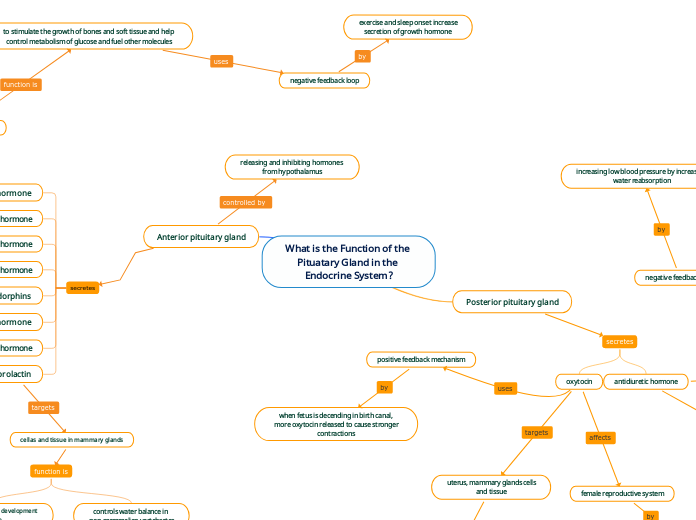por Hiba Shahid hace 4 años
250
What is the Function of the Pituatary Gland in the Endocrine System?

por Hiba Shahid hace 4 años
250

Ver más
cellas and tissue in mammary glands
function is
controls water balance in non-mammalian vertebrates
expelling or conserving water in kidneys when necessary
to stimulate breast development and milk production
positive feedback system
secreting more prolactin to create more lactation when infant is suckling
cells and tissue in the adrenal cortex
to stimulate secretion of glucocorticoids by the adrenal cortex
ovaries in females, testes in males
to regulate ovulation in females and secretion of sex hormones in males
reproductive system of female and males
male sex hormones directly impacts puberty, development of secondary sex characteristics, and spermatogenesis
regulation of ovulation controls menstrual cycle of females
pain pathways in nervous system
to inhibit perception of pain
pain stimulates the production of endorphins
melanocytes in skin and some vertebrae's
to promote darkening of skin
ovaries in females, testes in males
to stimulate egg growth and development and secretion of sex hormones in females, in males it stimulates sperm production
being regulated by testosterone in males
in females, hormone secretion decreases at end of menstrual cycle
thyroid gland cells and tissues
to stimulate the secretion of thyroid hormones and the growth of thyroid gland
negative feedback system
stopping secretion as concentration of thyroid hormone in blood increases
bone and soft tissue cells
to stimulate the growth of bones and soft tissue and help control metabolism of glucose and fuel other molecules
exercise and sleep onset increase secretion of growth hormone
excretory system
directly affecting kidneys
kidney cells and tissues
to increase blood volume and pressure by increasing water reabsorption in kidneys
negative feedback loop
increasing low blood pressure by increasing water reabsorption
female reproductive system
stimulate contractions at the end of pregnancy
positive feedback mechanism
when fetus is decending in birth canal, more oxytocin released to cause stronger contractions
uterus, mammary glands cells and tissue
to promote uterine contractions and milk release from breasts